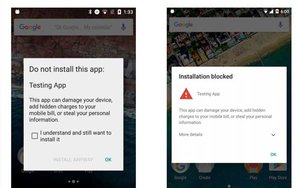Google Scans Billions Of Android Apps, Too Many In High-Risk Security Category
- by Laurie Sullivan @lauriesullivan, April 19, 2016
 Google's
motivation to keep app users safe as they search for information and explore new ways to make their life easier through mobile devices points to helping consumers feel secure and free from malware and
hackers. The safer consumers feel, the more they will use the apps and mobile Web and interact with branded content and paid-search ads.
Google's
motivation to keep app users safe as they search for information and explore new ways to make their life easier through mobile devices points to helping consumers feel secure and free from malware and
hackers. The safer consumers feel, the more they will use the apps and mobile Web and interact with branded content and paid-search ads.
In Google's second annual report on the state of Android security, the company says it now scans six billion Android apps daily on smartphones around the world to look for potentially harmful apps (PHAs), but another report suggests Android apps still fall into a higher-risk category. Too many are at risk of leaking consumer data.
It means Google now scans 400 million devices daily using automated systems to support Google Mobile Services, with the automated system protecting users who install apps from sources other than Google Play.
In 2015, PHAs were installed on less than 0.15% of devices that only get apps from Google Play. Include all devices in the Android ecosystem using Google's services, such as apps from third-party app stores, and this rises to 0.5%, up from 1% from the prior year.
Last year's changes to the automated platform reduced the probability of installing a PHA from Google Play by more than 40%, compared with 2014. Within Google Play, install attempts of most categories of PHAs declined, and including data collection fell by more than 40% to 0.08% of installs. Spyware fell by 60% to 0.02% of installs. Hostile Downloader fell by 50% to 0.01% of installs.
Not all security improvements are technical, per the report. Some come from understanding user behavior and making the easiest choice also the safest by adding red exclamation marks to signal a user's full attention. These changes resulted in the effectiveness of the PHA warnings provided by Verify Apps by more than 50%.
Separately, one report from Appthority notes that several tax apps could put personal information of users at risk from hackers. The San Francisco-based company found some of the more common tax application such as MyBlock from H&R Block exhibited more risky behavior than their iOS counterparts.
Along with the Android version of H&R Block’s MyBlock app, the iOS version of TaxBot, and an Android app known as Calculator for U.S. Taxes also fell into the high-risk category.
Apps in the lower-risk category range from the iOS versions of Evernote, TurboTax, Expensify, Quick Tax References, MyBlock, IRS’s own mobile app IRS2Go, MyTaxRefund, and TaxCaster, according to one report.



This should be the permalink to the report PDF:
http://source.android.com/security/reports/Google_Android_Security_2015_Report_Final.pdf